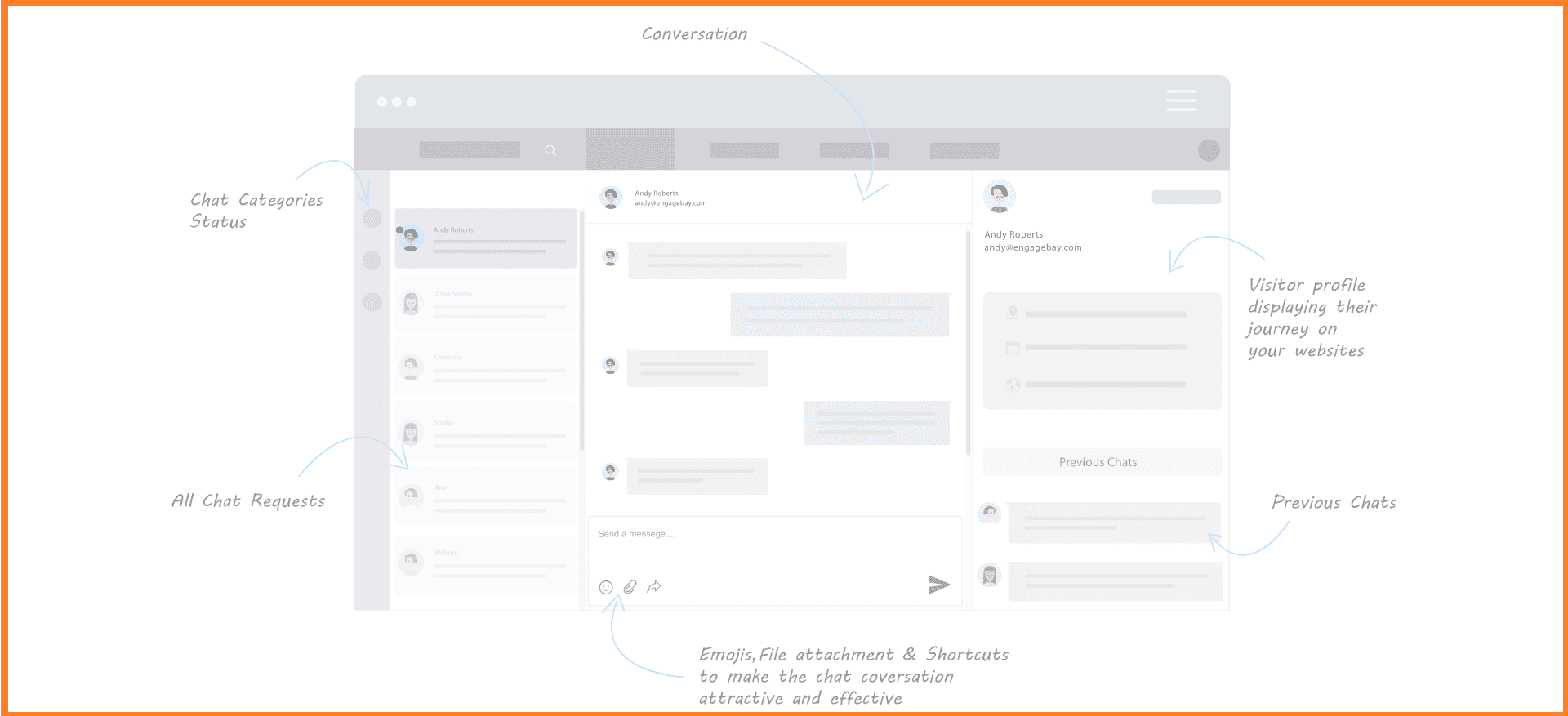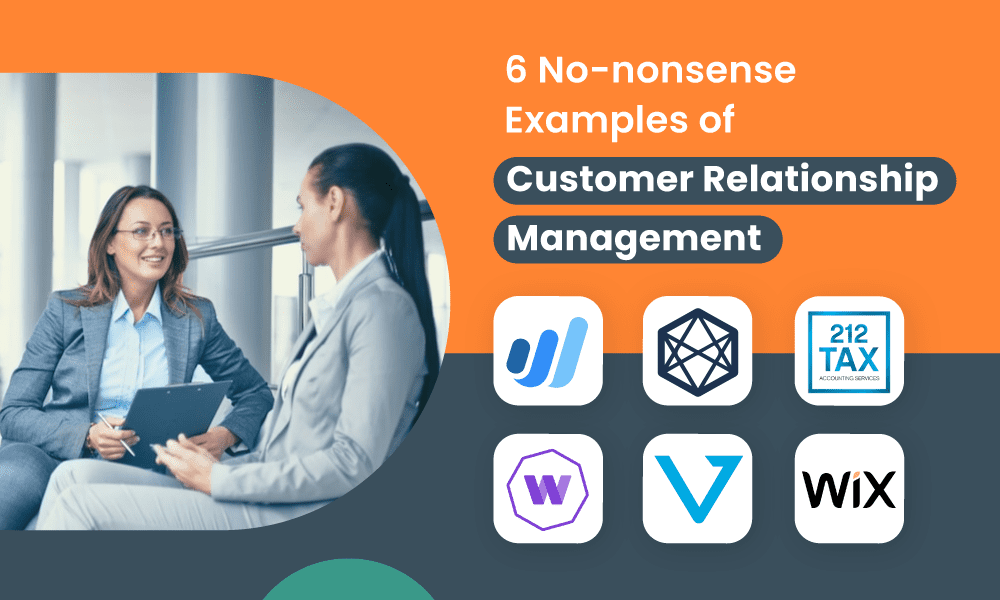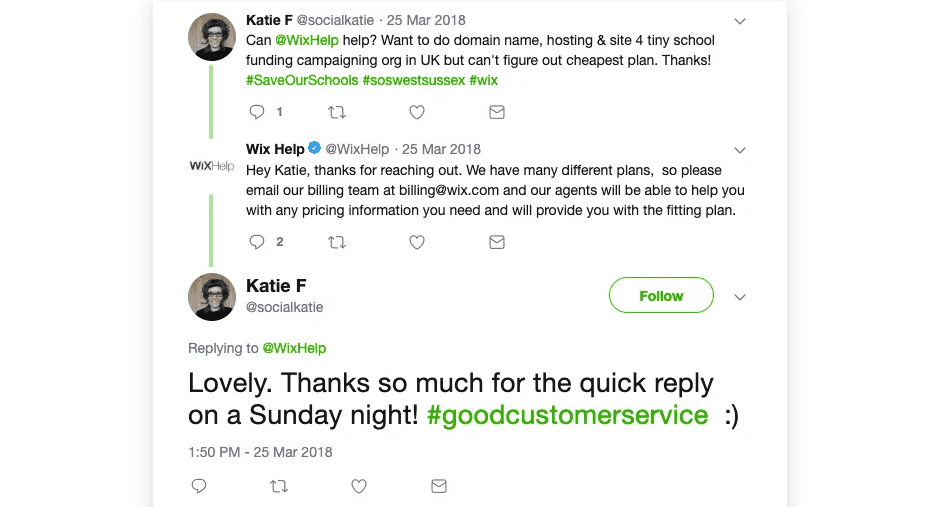As of August 2022, over 12,000 people search Google for customer relationship management (CRM).
You may have Googled “CRM” as well to understand how it can help you automate repeatable tasks, safely store and organize customer information, track customer communication and business metrics, save time, and do a lot more to ultimately grow your bottom line.
Irrespective of these benefits of CRM systems, one task your software can’t do is add a human touch to your operations. Without that human touch, your ability to establish trust with your customers reduces and friction in your purchase process could increase.
So, what should you do to add a human touch to your business and also make the most of your CRM software? That’s where unpacking some examples of customer relationship management helps.
In this post, we’ll look at 6 CRM examples you can use to reduce buyer objections and enhance your sales process. We’ll also go over some customer relationship management software for automating some of your tasks.
Let’s get going.
Table of Contents
1. Wave App’s Show of Empathy
“Too often, we underestimate the power of a touch, a smile, a kind word, a listening ear, an honest compliment, or the smallest act of caring, all of which have the potential to turn a life around.” Not our words; that’s Leo Buscaglia.
Surely, you can’t touch your customers. But you can elicit other feelings that Leo talks about through the words in your emails. When you do, the result is a happy customer who continues using your product and spreads the word. This was exactly the case for Ryan “RJ” Olestro, a Wave app user.
Like many companies, Wave app increased the subscription cost of its software because of inflation. They had to communicate the price hike to customers.
Here’s how they did it:
They read the room, created a thoughtful email, and showed that they care by comparing their increased, but more affordable rate, to the competition.
See how Ryan puts it:
Undoubtedly, this is a smart marketing play by the Wave app team with two takeaways:
- Study your competition
Without knowing what competitors were doing, the team would have needed a different angle to communicate the price hike. Fortunately, they studied their competition, and this helped in positioning their product as an affordable solution.
So, identify your competition’s weaknesses, turn them into strengths, and include them in your customer relationship toolbox.
- Nurture a good public image
Going viral on a social media platform like LinkedIn doesn’t take much effort. A single engagement by an influencer could set off a chain reaction of interactions with a post.
What do you think will happen when 200,000 people view Ryan’s post complimenting the Wave app? More sign-ups, more users, and more sales. The reverse is also true if the email was awful.
So, invest in framing your email communication properly before you hit send. The last thing you want is an unhappy customer who vents their frustration about your business on social media.
2. Nova Credit’s Web Copy In Voice of Customer
Website traffic is important for online businesses of all sizes. With more traffic, you improve your chances of getting more conversions.
However, a ton of traffic that doesn’t take action shows many things. One of them is the publishing of web copy that doesn’t resonate with your audience. Besides making prospects not understand what you do, such a copy may prevent would-be customers from using your offering, meaning you don’t get to serve these customers at all.
This challenge faced Nova Credit, a company that helps people apply for financial services in the U.S. using their international credit history.
So, how did they fix it?
👉🏾 They mined the voice of their customers (VOC) using surveys, updated their copy with the insights, and had a whopping 47% increase in homepage conversions. Like Nova Credit, you can evaluate the performance of your copy with tools like Sprig or the customizable and free EngageBay form tool.
This is how to do it with EngageBay:
After signing up for a free account, navigate to “Marketing” by clicking the dropdown.
Click “Forms” and select “Popup Form.”
Next, click “Design” and then “Fields.” Fields gives you access to radio buttons, checkboxes, and more.
Finally, edit your form’s “Look & Feel.”
When you’re done, be sure to edit your settings to block unwanted IP addresses and whatnot.
Doing this often will not only give you insights about your customers, it’ll help you to always win your customers with copy and content that solve their problems.

3. Build A Social Proof Arsenal like 212 Tax & Accounting Services
Before potential customers make a buying decision, they want to know they can trust you. That’s where social proof shines.
And small businesses like 212 Tax & Accounting Services know this so well. They respond to their Google My Business feedback if it’s good or bad.
Doing this helps them to:
- Show empathy
- Humanize their business
- Boost their online reputation
- Improve the search engine optimization of their business
Occasionally, you’ll come across negative reviews published by some of your unsatisfied customers. Don’t get mad.
Instead, craft a response that can win over anyone who reads the review. If you feel stuck, you can tweak some templates to help you respond to your customers effectively.
Besides Google My Business, you can build social proof by monitoring customer reviews on platforms, like:
- G2 (for startups)
- TrustPilot
- Yelp
Also, you can use tools like Hootsuite to respond to Google My Business reviews and monitor brand mentions for free with Google Alerts.
4. Leverage Automated Live Chat Like WorldRemit
Live Chat is a flexible tool for managing the relationship with customers on your web page.
In a survey of over 1,000 US consumers, 41% of the respondents preferred the personal and instant means of interaction provided by Live Chat.

With Live Chat, you can automate responses to the frequently asked questions of your customers. This way, you don’t keep customers waiting for extended periods. Plus, these automated responses give you more time for other important tasks.
Take it from WorldRemit.
Before adopting Live Chat into their operations, they were constantly receiving a large volume of calls. These calls were mostly packed with similar questions by customers. To fix this, they used Live Chat to automate responses to common queries.
The result?
- 60% of calls were deflected from Live Chat to self-serve
- 30% bot engagement on the web support page
- 140,000 bot interactions per month
There are lots of paid live chat tools out there. But if you want a cost-effective and free solution, you may want to use EngageBay Live Chat.

EngageBay Live Chat allows you to:
- Assign chats
- Configured chatbots
- Show offline message
- Send chat transcript to visitor
- Create web rules, chat forms, and chat widgets
You can also do a lot more with the free Live Chat to:
- Streamline your business processes
- Enhance customer engagement
- Boost productivity
- Improve your customer’s overall experience
5. Vont’s Lead Nurturing Powerhouse
Not all leads are created equal. When some leads land on your website, they’ll immediately trust you and buy your product, others won’t.
This is where automating lead nurturing comes into play.
With automation, you can nurture a cold, uninterested lead to become a hot lead who uses your product.
Executing this properly will help you:
- Maintain a great relationship with potential customers
- Gain the trust of your potential customers
- Increase sales of your product
While you can use a multi-channel strategy like social media, retargeting ads, and YouTube videos to nurture leads, a top way of doing this is through email.
Danty, the Head of Marketing of Vont, knows this all too well. According to Danty, one of their email campaigns resulted in $54,000 in revenue.
“We recently launched a new product which we teased for a few weeks and recently announced. After we sold out and restocked, we sent this email to customers to drive FOMO. Even without a coupon, the email was extremely successful. We sent it to 82k email subscribers, had a 56% open rate, and a 7.3% click-through rate.”
Like Danty said, they didn’t need a coupon to entice customers because they nurtured them for weeks. Want to create similar email campaigns? You can do it for free.

6. Wix’s Response To Customers on Social Media
Have you ever complained about a brand or requested help from them on social media? Maybe not. But lots of customers do. See 👇
When this happens, customers want a fast response and resolution to their challenges.
See what Laura Wilson says about this:
Everyone loves a company that comes back to you quickly when having to complain about their services. @hootsuite unfortunately does not seem to be one of these companies…. #badcustomerservice
— Laura Wilson (@LauraWilsonEdin) June 20, 2019
Complaints from customers like Laura give you an opportunity to:
- Step in
- Resolve the challenge
- Position yourself as a quality brand for potential customers
- Support your current consumer base
- Retain your customers for the long term by showing you care
This can even boost your brand awareness if such complaints go viral. And as Blaise puts it:
“People will complain about you regardless of your presence on social media. The only real question is — do you want to be a part of that conversation?”
81% of those aged 25-34 have complained about a brand through social media. So, the reality is that people will complain about you whether you’re on social or not – the only real question is do you want to be a part of that conversation? – Kasasa
— Blaise 🔥 🔥 🔥 | Maritime Vintage (@Blaise_MV) December 16, 2021
Lyndal Cairns shares a closely similar sentiment.
You do not have to DM or take your complaint out of the public eye to demand good customer service. If you have a grievance and the company has an active channel, don’t let them make you feel bad for engaging there. Choose where you want to engage and have them respond.
— Lyndal Cairns ✍️ (@lyndalcairns) September 4, 2019
Customer Relationship Management Software That Can Help
Now that you’re familiar with these CRM examples, let’s look at some software tools you can use to automate your CRM processes.
1. EngageBay
EngageBay is an integrated CRM software with a suite of marketing, sales, and helpdesk tools for small to midsize enterprises.
Having these tools in a centralized place allows you to acquire, engage and convert website visitors without juggling multiple software. Currently, EngageBay has over 46,000 customers and is well-known for its affordability, responsive customer support, and rich features.
EngageBay Features
- Telephony
- Autoresponders
- Live chat/helpdesk
- Email marketing suite
- Contact management
- Ticketing management
- Customizable forms and popups
- Landing page templates and builder
- Automation and workflows
EngageBay Pricing
EngageBay has one of the most flexible pricing in the CRM market. You can opt for monthly, yearly (10% off), or biennial (20% off) billing.
Here’s what EngageBay costs:
- Free plan: $0 for over 20 features
- All-in-One Suite: $14.99 for Basic, $49.99 for Growth, and $99.99/month for Pro, all billed monthly per user.
- Sales Bay: $12.99 for Basic, $29.99 for Growth, and $59.99 for Pro, all billed monthly per user.
- Service Bay: Free Help Desk & Live Chat
2. HubSpot
HubSpot is an all-in-one CRM system like EngageBay. They have a Marketing Hub, Sales Hub, Customer Service Hub, CMS hub, and Operations hub.
While HubSpot has robust functionalities like EngageBay, two major challenges for users are its unaffordability and complex pricing — especially for small business owners. According to HubSpot, over 150,000 customers use their tools and integrations to attract, engage, and delight customers.
HubSpot Features
- Knowledge Base & playbooks
- Voice over Internet Protocol (VoIP) calling
- Help desk automation
- Customer feedback surveys
- Email marketing suite
- Ticketing management
- Customizable forms and popups
- Landing page templates and builder
- Automation and workflows
- Mobile inboxes
- Conversation routing
- Inbound calling system (For managing & tracking inbound calls made to a mobile device)
HubSpot Pricing
- Access to a free plan
- CRM Suite: $50/mo for Starter, $1,780/mo for Professional, and $5,000/mo for Enterprise. One-time mandatory onboarding fees for the last two plans cost an additional $3,750 and $12,000 respectively.
- Marketing: $50/mo for Starter, $890/mo for Professional, and $3200/mo for Enterprise. One-time mandatory onboarding fees for the Pro and Enterprise accounts are $3,000 and $6,000 respectively.
- Sales: $50/mo for Starter, $500/mo for Professional, and $1200/mo for Enterprise. One-time onboarding fees for the last two plans are $375 and $3,000 each.
- Customer Service: $50/mo for Starter, $400/mo for Pro, and $1,200/mo for Enterprise. One-time onboarding costs an additional $375 for Pro and $3,000 for Enterprise.
3. ActiveCampaign
ActiveCampaign is a CRM software that offers email marketing, marketing automation, and CRM tools you need to create incredible customer experiences.
Similar to EngageBay, ActiveCampaign provides free migration of your data and serves over 180,000 customers.
But unlike HubSpot and EngageBay, ActiveCampaign doesn’t have a free plan for you to test the product for an extended period. Plus, the software has many features like EngageBay, but the pricing appears to be steep for some small business owners 👇
ActiveCampaign Features
- Email marketing templates and builder
- Campaign and automation reporting
- Landing pages templates
- Marketing automation
- Subscription forms
- Marketing attribution
- Email design testing
- Predictive sending
- SMS marketing
ActiveCampaign Pricing
ActiveCampaign bills users based on their number of contacts. Here’s a glimpse into the pricing:
| 500 contacts | 1,000 contacts | 2,500 contacts | 5,000 contacts | |
| Lite plan | $15 | $39 | $61 | $99 |
| Plus plan | $70 | $70 | $125 | $186 |
| Professional plan | $187 | $187 | $187 | $262 |
| Enterprise plan | Custom pricing | Custom pricing | Custom pricing | Custom pricing |
Note: You get CRM access only with the Plus plan and upward.
4. SharpSpring
SharpSpring is an excellent CRM for small businesses and agencies that need a full-funnel marketing and sales automation platform. While over 12,000 customers use this SharpSpring, some users say this tool has a steep learning curve and a complex interface.
SharpSpring Features
- Automated email responses
- Automated alerts and tasks
- Data quality management
- Landing pages and forms
- Online behavior tracking
- Lead management
- Email marketing
- Basic reporting
- Web analytics
- Segmentation
SharpSpring Pricing
SharpSpring has simple, but expensive pricing tiers, which are based on the number of a user’s contacts.
Here’s what SharpSpring costs:
- Free plan: Unavailable
- Besides the pricing below, you can request custom pricing if you want an agency or enterprise plan
| 1,000 contacts | 10,000 contacts | 20,000 contacts | |
| Monthly cost | $449 | $999 | $1,499 |
| What’s included | Unlimited users
Unlimited support Full set of features |
Unlimited users
Unlimited support Full set of features |
Unlimited users
Unlimited support Full set of features |
Manage Customers Better With EngageBay
Customer relationship management is key to the success of your business. But you can’t adequately do this if you’re absent from your customers’ channels. This includes social media, forums, and even email.
By becoming available on these channels, you can spot your customers’ challenges, address them, and strengthen their emotional connection to your business.
That said, you can’t do it alone. You’ll need a CRM and marketing automation platform like EngageBay to keep track of everything you do.
Here’s what Dan, a small business owner, says about EngageBay:
So sign up for a free account, or book a 15 to 30 minutes demo with our experts, and we’ll be happy to help.
Until next time.
Gracias.














